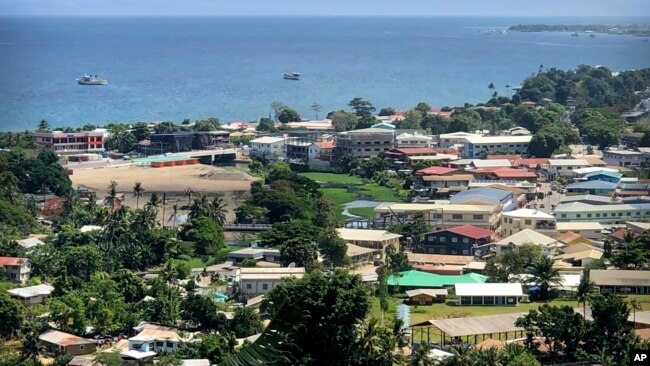世界は、次々と起こる事件で覆われていってしまいます。
VOAで英語を学びましょう!!
ソロモン諸島、選挙を延期へ 新たな懸念が浮上(和訳)
Solomon Islands to Delay Election, Raising New Concerns
September 09,2022
南太平洋に浮かぶ島国ソロモン諸島の議員たちは、木曜日、国の総選挙を2024年まで延期することを決議しました。
選挙は来年に予定されていました。
野党議員は、この動きは政権奪取のための試みであり、さらなる内乱につながる恐れがある言います。
7ヶ月の延期には憲法改正が必要でした。マナセ・ソガバレ首相は、この動きは必要なことだと述べます。ソガバレ首相は、来年はパシフィック・ゲームズというスポーツイベントが開催されると述べました。ソガバレ首相は、同時に選挙を行うことは、政府にとってあまりにもコストがかかり、困難であると述べています。
しかし、野党指導者のマシュー・ウェイル氏は、この動きは2023年に国民が投票する権利を失うことになると議員に語っています。
ウェイル氏は、「この法案は、首相が必要以上に長く政権を維持しようと企んだ結果である 」と述べたています。
彼は、ソガバレ氏は、"国民の明確な意思に反して、2週間のイベントのために憲法を改ざんする用意のある国として、この地域の笑いものにすることに成功した "と言いました。
野党議員も、この法案の国会通過を急いだことに異論を唱えました。法案を提出する通常の手続きを無視したのです。
しかし、ソガヴァレ氏は国会で反対派より多くの支持者を得ています。彼は、憲法改正に必要な3分の2の多数を簡単に獲得することができました。
ソガバレ氏は、この延期は太平洋競技大会の成功を保証するものであり、選挙がどのように行われるかについて何も変えるものではないと述べています。
彼は、「この法案は、基本的に議会の解散を延期するものです。」 と言っています。
70万人の国民の多くは、ソガヴァレ氏の延期の理由に疑念を抱いています。また、この法案がさらなる騒乱を引き起こすのではないかと心配する人もいます。
昨年11月、首都ホニアラで暴動が発生しました。政府が台湾から中国への国交断絶を決めたことに抗議する平和的な抗議行動として始まりました。その後、抗議は暴力的になりました。暴動の後、焼け落ちた建物から3人の遺体が発見されました。
翌月、ソガヴァレ氏は国会から解任される可能性のあった投票に勝ち残ったのです。
それ以来、ソガヴァレ氏は新たな安全保障協定に署名し、中国との関係を強化する方向に動いています。この協定は、周辺国や米国を含む他国の懸念を引き起こしました。彼らは、この協定がこの地域の軍事力増強につながることを恐れています。
しかし、ソロモン諸島との関係を再構築するための欧米の今年の努力は、進展を見せていません。ソガバレ氏は、ホニアラで行われた第二次世界大戦の大きな戦闘を記念する追悼式に出席しなかったのは特筆に値します。この式典には、ウェンディ・シャーマン米国務副長官や他の外国政府高官が出席していました。
そして今週初め、オーストラリアのペニー・ウォン外相は、ソロモン諸島の選挙が予定通りに行われるよう、自国が選挙費用を負担すると申し出たと述べていました。ソガバレ氏はこの申し出を批判し、オーストラリアが干渉していると非難しました。
ソガバレ氏は、ウォン氏の発言は、オーストラリアが木曜日の憲法改正案に反対票を投じるよう議員に影響を与えようとしていることを示していると指摘しました。さらに、これはソロモン諸島の議会民主主義に対する攻撃であると付け加えました。そして、これは外国政府による国政への直接的な干渉であると述べました。
Solomon Islands to Delay Election, Raising New Concerns
Lawmakers in the Solomon Islands, an island nation in the South Pacific Ocean, voted Thursday to delay their nation’s general election until 2024.
The election had been planned for next year.
Opposition members say the move could be an effort to seize power and some fear it could lead to more civil unrest.
The seven-month delay required a constitutional amendment. Prime Minister Manasseh Sogavare said the move was necessary. He said the nation is holding the Pacific Games sports event next year. Sogavare said holding an election at the same time would be too costly and difficult for the government.
But opposition leader Matthew Wale told lawmakers that the move would cost people their right to vote in 2023.
Wale said, “This bill is a result of a scheme by the prime minister to remain in power for longer than is necessary.”
He said Sogavare “has succeeded in making us the laughingstock of the region, as a country that is prepared to tamper with its constitution for a two-week event, against the clear wishes of its people.”
Opposition members also objected to the way the bill was quickly rushed through Parliament. It ignored the normal process that permits for public submissions.
But Sogavare has more supporters in Parliament than his opponents. He was able to easily get the two-thirds majority he needed for a constitutional change.
Sogavare said the delay would ensure a successful Pacific Games and did not change anything about how the election would run.
He said, “The bill is basically to defer the dissolution of Parliament.”
Many people in the nation of 700,000 remain doubtful of Sogavare’s reasons for the delay. Some worry it could result in more unrest.
Last November, rioting erupted in the capital, Honiara. It began as a peaceful protest against the government’s decision to change diplomatic recognition from Taiwan to China. The protest later became violent. After the riots, three bodies were found in a burned-out building.
The following month, Sogavare survived a vote that could have removed him from Parliament.
Since then, Sogavare has moved to strengthen his nation’s ties with China by signing a new security agreement. The deal has raised concerns among neighboring countries and others including the U.S. They fear the deal could lead to a military buildup in the area.
But Western efforts this year to rebuild relationships with the Solomon Islands have not shown progress. Sogavare was notably not present at a memorial service in Honiara marking a big World War II battle. It was attended by U.S. Deputy Secretary of State Wendy Sherman and other foreign officials.
Then earlier this week, Australian Foreign Minister Penny Wong said her country had offered to pay for the Solomon Islands election to help keep it on time. Sogavare criticized the offer, accusing Australia of interfering.
Sogavare said Wong’s statement showed Australia was trying to influence lawmakers to vote against Thursday’s constitutional amendment. He added it was an attack on the Solomon Islands’ parliamentary democracy. And he said it was direct interference by a foreign government into the country’s affairs.
Words in This Story
scheme – n. a clever and often dishonest plan to do or get something
laughingstock –n. a person or thing considered foolish
region – n. a part of a country or the world that is different or separate from other parts in some way
tamper – v. to change or touch (something) especially in a way that causes damage or harm
submission – n. an act of giving a document, proposal, or piece of writing to someone so that it can be considered or approved
defer – v. to choose to do (something) at a later time
dissolution – n. the act of officially ending a marriage, organization, or agreement
affairs –n. (pl.) work or activities done for business, public or personal purposes
